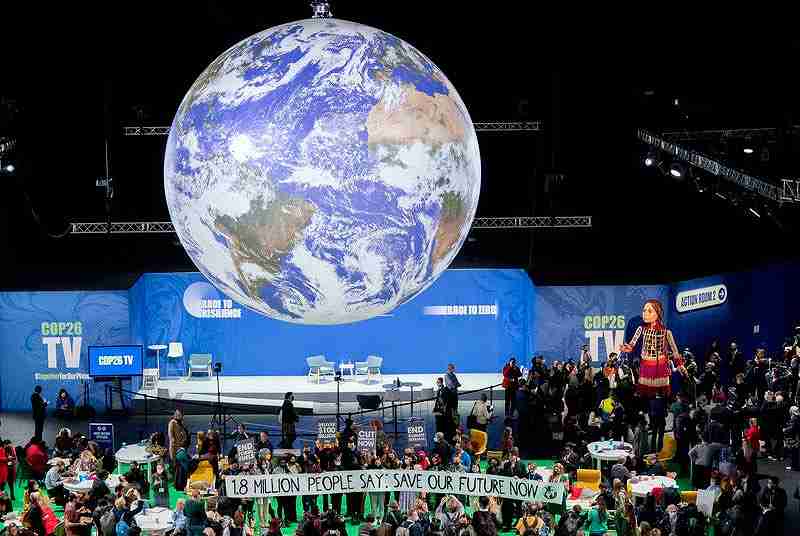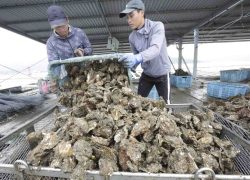
Giant puppet Little Amal, right, walks through the Action Zone inside the venue of the COP26 U.N. Climate Summit in Glasgow on Tuesday. According to the COP26 website, the puppet is there “to raise awareness of the disproportionate impact of climate change on women and girls around the world.”
November 10, 2021
GLASGOW — Japan, the United States and European nations are among an international alliance of 73 nations and regions that agreed Tuesday to enhance their aid to developing countries on measures to cope with emissions of chlorofluorocarbons, during the 26th U.N. Climate Change Conference of the Parties (COP26) in Glasgow.
The international alliance, formed under the Nairobi-based U.N. Environment Program, will place an initiative led by Japan at the center of these CFC-related activities.
CFCs are used as refrigerant gases in air conditioners and large refrigerators. It is believed that the greenhouse effect of CFCs is hundreds of times to 10,000 times worse than carbon dioxide.
About 4% of Japan’s greenhouse gas emissions comes in the form of CFCs. The nation is regarded as one of the most progressive countries regarding the strictness of its regulations on CFCs, as the government obliges businesses to recollect the gases from discarded refrigerators and other such products. The technologies used for recovery and disposal of CFCs is also advanced.
On the other hand, there are more than 100 developing countries that have not taken any measures to cope with CFC emissions.
According to the Environment Ministry, it is predicted that the number of air conditioners worldwide will increase in the coming 30 years at a pace of 10 units per second. Under the current situation, most CFCs in air conditioners are discharged into the atmosphere without being processed.
During the alliance’s ministerial meeting on Tuesday, members shared the opinion that measures to cope with CFC problems in developing countries are essential for capping the rise of global temperature at 1.5 C compared with the level before the industrial revolution.
They agreed to set up a CFC-related task force of experts and make progress with the measures.
Practically, the alliance will make use of the Initiative on Fluorocarbons Life Cycle Management launched by Japan during the COP25 meeting in 2019.
Participating in the initiative are 14 countries and international organizations such as Japan, Britain, France, the Philippines, Vietnam and the World Bank. The initiative has conducted such activities as assisting developing countries in acquiring technologies for recovering and disposing of CFCs, helping them take legislative actions for the purpose and training of administrative officials.
An agreement document adopted Tuesday presented a prediction that the volume of CFC emissions worldwide could be reduced by up to 99.5% by 2050 from the level in 2010.
Top Articles in Science & Nature
-

Japan Institute to Use Domestic Commercial Optical Lattice Clock to Set Japan Standard Time
-

Japan to Face Shortfall of 3.39 Million Workers in AI, Robotics in 2040; Clerical Workers Seen to Be in Surplus
-

Record 700 Startups to Gather at SusHi Tech Tokyo in April; Event Will Center on Themes Like Artificial Intelligence and Robotics
-

iPS Treatments Pass Key Milestone, but Broader Applications Far from Guaranteed
-

iPS Cell Products for Parkinson’s, Heart Disease OK’d for Commercialization by Japan Health Ministry Panel
JN ACCESS RANKING
-

Japan PM Takaichi’s Cabinet Resigns en Masse
-

Japan Institute to Use Domestic Commercial Optical Lattice Clock to Set Japan Standard Time
-

Israeli Ambassador to Japan Speaks about Japan’s Role in the Reconstruction of Gaza
-

Man Infected with Measles Reportedly Dined at Restaurant in Tokyo Station
-

Videos Plagiarized, Reposted with False Subtitles Claiming ‘Ryukyu Belongs to China’; Anti-China False Information Also Posted in Japan
























